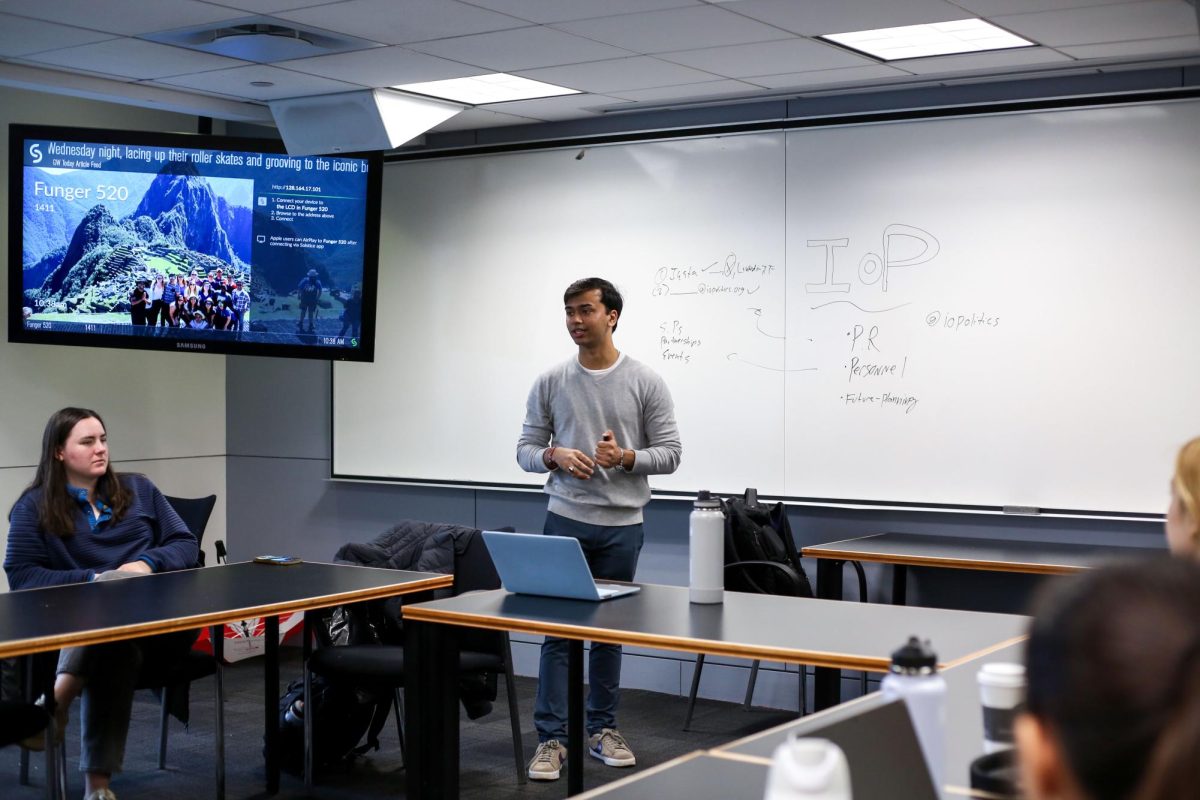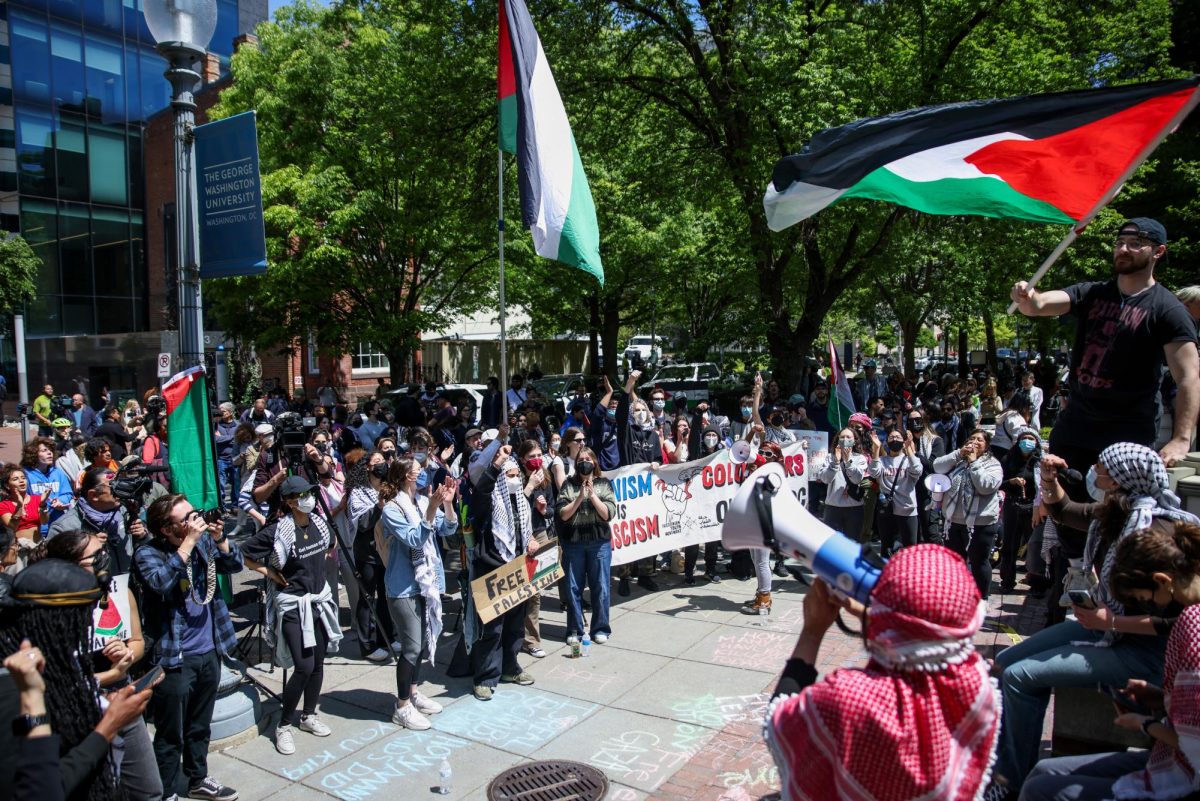A group of students is working to establish an institute that offers research, internship and networking opportunities for political science students at GW by fall 2024.
The student-led institute — which was inspired by institutes of politics at the University of Chicago and Harvard University — would connect students to political and social science research, offer volunteering and internship opportunities with government organizations and host speaker events catered toward political and social science students if approved by the University. But leaders said they have faced difficulties getting officials to approve the charter that would officially establish it as an institute at the University.
“Schools around the country had an institute of politics, but we didn’t and we were in D.C.,” junior and institute founder Manav Raval said. “It felt like we weren’t utilizing those opportunities for students that would benefit the students and so I decided that these other schools have this, why not try to integrate it within GW itself.”
Raval said the group filed for nonprofit status with the IRS and became a registered nonprofit in the District in December. After receiving the designation, he began talking with deans in the Columbian College of Arts & Sciences, the Trachtenberg School of Public Policy and Public Administration, the Elliott School of International Affairs and the School of Media & Public Affairs.
He said the organization needs a signature from one dean from any school to submit a charter proposal to officials, but he said the deans have been hesitant to sign. He said they are worried the institute will not receive funding because the group is student-led. Raval said the institute is currently “in the process” of securing donors.
He added that the deans advised him to involve faculty before they would consider signing because professors could maintain the organization’s stability as students graduate. He said members have since gotten 10 faculty from schools like CCAS and Elliott, who would advise each of the institutes’ five departments: student programs, student task forces, research, partnerships and events.
“We want to immerse students in politics and related fields, but we also want to promote politics in a practical sense,” Raval said. “We want to, on top of everything, encourage action and we want to instill in students the drive to tackle real-world problems.”
Senior Elizabeth Paul, who serves as the institute’s executive adviser, said the group originally wanted to establish an institute in fall 2023 but officials told them last spring and again in the fall to work with the Nashman Center for Civic Engagement and Public Service or apply to be a student organization, despite some officials saying their idea was too expansive to be a student group. Paul said the group now has faculty involved and exists as a registered nonprofit, but securing University approval for the institute remains out of their hands.
“We’ve done all this prep,” Paul said. “We have officially gotten our nonprofit status and that should help us secure some types of partnerships and donors. But really, at this point, we are waiting on the approval of other people, whether that be donor parties or the University.”
She said the group has started brainstorming alternative plans for the institute, like operating as a nonprofit separate from GW. But she said it will be difficult to function at the level members are hoping to by the fall without having the resources that institutes at GW have, like their status and funding.
“The problem is that donors want to see the University approve us to feel willing to donate but the University wants to see donors to be willing to approve us,” Paul said. “So it’s hard to balance how to get one or the other when they’re dependent on each other.”
Paul said she envisions the institute would be similar to the Nashman Center, which exists as its own entity while still receiving funding from the University.
Raval said, if approved, the institute would offer students the opportunity to apply to conduct social science research in small groups under the advisement of a faculty member.
Raval added that the institute would hold research symposiums where students can showcase their studies as well as an Institute of Politics Fest at the end of each academic year, where the organization can recap the programming the institute conducted throughout the year.
“There’s a difference between getting taught something and then applying it to a real-life situation,” Raval said. “So if they feel interested, they’re going to be taught how to do a lit review, how to do an abstract, a needs assessment, stuff of that sort, and then in the end, we hope to publish it internally.”
Raval added that the institute’s status as a nonprofit will help facilitate professional partnerships with external organizations, like the U.S. Agency for International Development, which they are currently in discussions with.
“We really want to make it more efficient and accessible for students to have those ensured internship opportunities really at their fingertips,” he said.
Sophomore Lily Vanderlaan said she would coordinate student research teams and plan events for the institute as its director of student programs. She said the student-led institute would create a more welcoming environment for students to approach faculty and begin conducting research, which can be intimidating.
“It can be a little challenging, especially as an undergrad poli sci or IA student to know where to start for research,” Vanderlaan said. “And to have this organization of people who are welcoming and are super open to hearing ideas about research, I think that’s really helpful and can get people started in their careers and what they’re interested in a little earlier.”
Vanderlaan said she hopes to reach students through social media to advertise the institute and plans to hold interest meetings closer to the fall. She said the institute would focus on opportunities in political science but she hopes students of any major will feel like they can join.
“We want it to be pretty broad, and to be able to provide the most amount of students with just whatever it is that they’re interested in,” Vanderlaan said. “So we just kind of want students to be able to build a community within the IOP and also to get connected on campus, get involved in local government or national government, whatever it is that they want.”
Fiona Bork contributed reporting.





